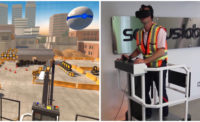To help meet the industry’s persistent demand for heavy equipment operators, Local 150 of the International Union of Operating Engineers has gone virtual. Facing a bottleneck in getting apprentices ready to operate heavy iron, the union went all in on simulators, and is now running 11 of the Vortex Advantage stations from CM Labs. And according to trainers, results so far have been promising.
“We were able to double the number of members we got through any one class,” says Mark Kara, assistant coordinator for Local 150’s Apprenticeship and Skill Improvement Program. “We’ve been dabbling in simulators since 2009,” he says. “But those had you sitting in an office chair staring at a screen. It didn’t emulate a real machine very well.”
The Vortex simulators feature multiple monitors and can run different training programs. Local 150 currently has four kinds of earthmoving equipment programmed: excavator, backhoe loader, bulldozer and front-end loader. The simulator isn’t meant to replace stick time on real equipment, but it does give first-time operators a chance to familiarize themselves with the controls and the basics. The cab even vibrates realistically during work, allowing future operators to learn how to run the real machines “by the seat of their pants,” as Kara explains.
Instead of needing multiple instructors on a site with real machines to monitor students, one instructor can walk a room with a dozen simulators. “Noise is a factor in equipment training, but with these we can turn the volume down and guide them through the different exercises,” he says.
The simulators are used not only by apprentices, but also by working operators who want to learn a new type of machine. Local 150 represents over 23,000 workers and its territory covers northern Illinois, northern Indiana and eastern Iowa. With strong demand for operators, there is pressure to train up not only new apprentices but get existing operators proficient on different kinds of heavy equipment.
“Right now, an individual can just walk in, reserve a simulator, and work at their own pace to get the fundamentals down,” says Kara. With so few months during the year when working operators can take time off for training, the simulators offer them some flexibility.
But it’s more than just running the simulators. Kara and Local 150 worked with CM Labs to get the performance data from individual simulators, so students could be graded and have their progress centrally monitored. This was a new feature, and Kara says it has improved the union’s ability to track the performance of students.






Post a comment to this article
Report Abusive Comment